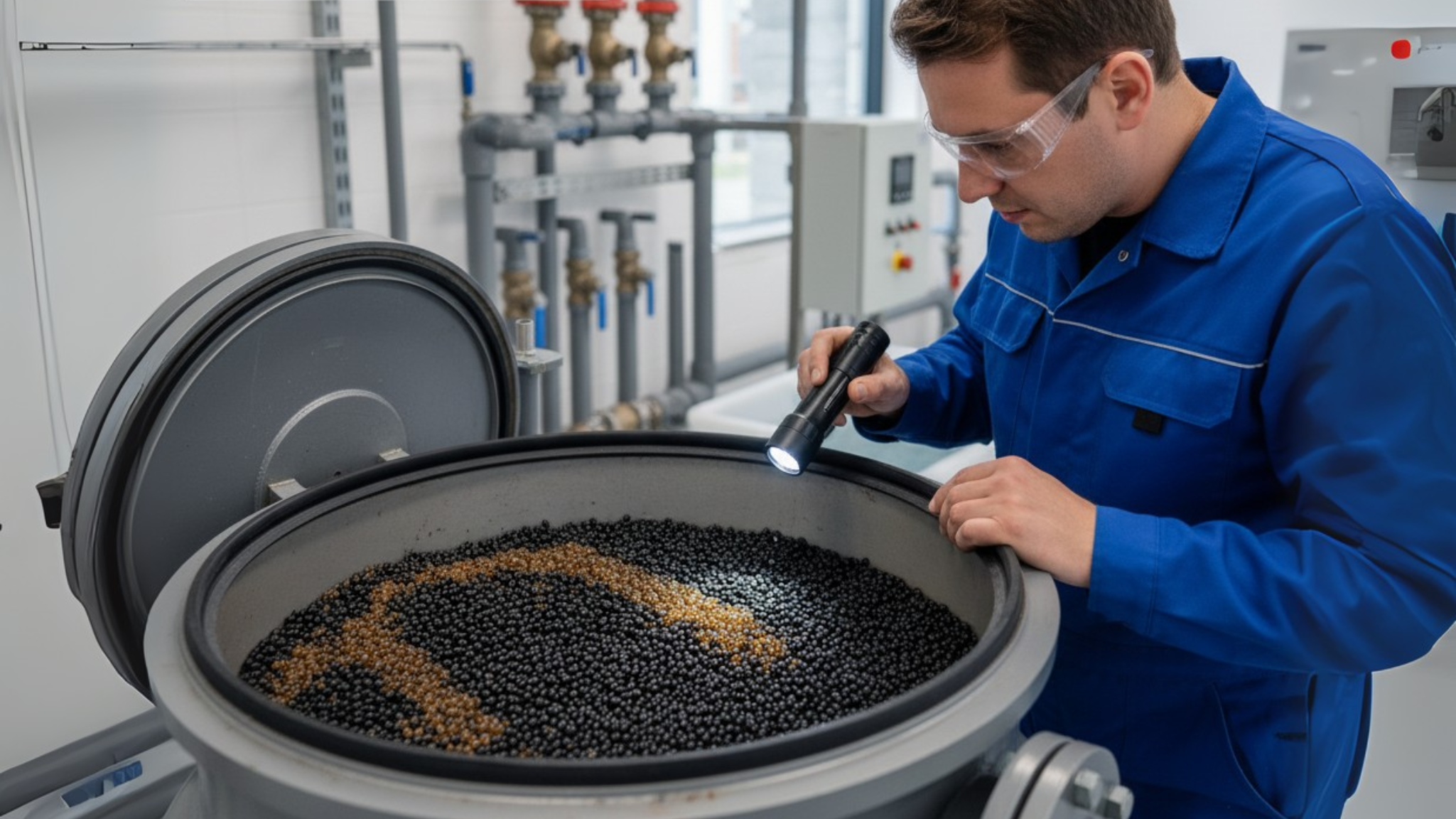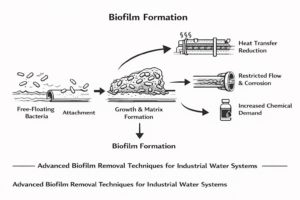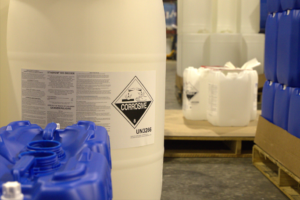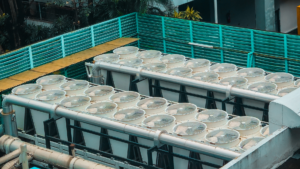In the water treatment industry, demineralizers play a crucial role in producing high-purity water for industrial facilities, municipalities, and utilities. These systems remove dissolved ions that can cause scaling, corrosion, and operational inefficiencies. Yet despite their importance, demineralizers are especially vulnerable to seasonal changes in source water quality. As conductivity, temperature, and organic loading shift throughout the year, water treatment professionals must adjust their strategies to protect system performance.
This is where the expertise of a water treatment chemical distributor becomes essential. Distributors supply the water treatment chemicals and technical guidance that operators rely on to keep demineralizers running effectively, even as seasonal conditions fluctuate. By providing targeted solutions and helping facilities understand how water chemistry changes with the seasons, distributors safeguard both water quality and equipment reliability.
For regions like Pennsylvania and Ohio, where ETI supports distributors and facility operators, seasonal variations are part of daily operations. In this article, we’ll explore the most common demineralizer challenges caused by seasonal changes and how water treatment chemical distributors can help facilities address them with chemistry-driven strategies.
Understanding Seasonal Demineralizer Challenges
Demineralizers are designed to provide consistent, high-purity water, but their performance is directly tied to the quality of the source water feeding them. Seasonal shifts in water chemistry can create significant challenges, particularly in regions where rivers, reservoirs, and surface waters serve as primary supplies. These fluctuations occur naturally throughout the year and can alter conductivity, temperature, and the concentration of dissolved ions, all of which impact throughput and efficiency.
For example, warmer months often bring increased biological activity and higher conductivity, which means more ions in the feedwater. This added ion load causes demineralizers to reach exhaustion sooner, leading to shorter run lengths between regenerations. In contrast, colder seasons can change water density, altering backwash performance and sometimes masking resin degradation by temporarily improving throughput. Spring runoff can also introduce tannins, lignins, and other organic matter into surface waters, increasing the risk of fouling.
Common Seasonal Problems in Demineralizers
Seasonal changes can create a variety of issues that directly affect the performance and reliability of demineralizer systems. While every facility’s water source is unique, several common problems occur as water chemistry shifts throughout the year.
Short Runs
One of the most frequent seasonal challenges is reduced throughput, or “short runs.” Higher ion concentrations in warmer months force resin beds to exhaust more quickly, which increases regeneration frequency and reduces the overall volume of high-purity water produced. Even when water quality remains acceptable, shorter run times can disrupt operations, increase chemical consumption, and raise costs for facilities.
Resin Fouling
Spring and fall often introduce higher levels of organic matter and suspended solids into surface waters. Organics such as tannins and lignins behave like anions and bond with resin, while iron or silt can precipitate and embed within the resin bed. These forms of fouling restrict ion exchange capacity, extend rinse times, and degrade system efficiency. If untreated, fouling can lead to premature resin replacement and higher maintenance needs for connected equipment.
Channeling and Backwash Problems
Water density changes with temperature, and this directly affects how resin beds expand during backwash. A flow rate appropriate for winter may be insufficient in summer, causing solids to remain trapped in the resin and leading to channeling. Channeling forces water through preferential pathways instead of evenly across the resin bed, creating areas of poor treatment and reducing water quality.
Environmental and Cost Impacts
These seasonal issues are not only operational challenges but also carry broader implications. Increased regenerations consume more treatment chemicals, generate higher wastewater volumes, and impact the surrounding environment. Inefficient demineralizer cycles also raise costs, requiring more frequent maintenance and reducing system lifespan.
By recognizing these seasonal problem patterns, facilities and their partners can prepare proactive strategies that protect clean and safe water production, lower chemical use, and keep water treatment systems operating efficiently year-round.
Also Read: From Resin Fouling to Resin Loss: How to Spot and Solve Demineralizer Problems
Chemical Strategies for Seasonal Stability
Seasonal water changes demand chemistry programs that can adapt quickly. A one-size-fits-all approach often leaves systems vulnerable to fouling, scaling, or poor regeneration efficiency. This is where customized water treatment solutions play a vital role, helping facilities stabilize demineralizer performance throughout the year.
Key strategies include:
- Addressing Organic Fouling
- Apply surfactants or cleaning agents to break down organic matter such as tannins and lignins.
- Use a caustic brine squeeze as a preventative measure for resin fouling in systems exposed to high-organic feedwater.
- Controlling Iron Fouling
- Incorporate specialty iron cleaners into regeneration cycles to remove iron deposits from cation resin.
- Regular sampling and monitoring ensure iron buildup is addressed before it compromises run length or water quality.
- Preventing Scaling and Corrosion
- Utilize corrosion inhibitors and blended formulations that reduce the risk of calcium sulfate precipitation.
- Step-wise acid regeneration helps prevent gypsum formation while ensuring effective resin regeneration.
- Optimizing Chemical Dosages
- Adjust acid and caustic feed rates seasonally to maintain target regeneration strength.
- Fine-tuning dosages prevents underfeeding or overfeeding, both of which reduce resin efficiency.
- Leveraging Custom Blends
- Work with a water treatment chemical distributor to access cost effective water treatment products tailored to the unique chemistry of local source waters.
- These solutions ensure reliable system performance and help facilities consistently improve water quality despite seasonal fluctuations.
When applied effectively, these chemistry-driven approaches reduce downtime, extend resin life, and maintain safe water standards across industrial and municipal operations.
The Distributor’s Role in Seasonal Troubleshooting
Adapting demineralizers to seasonal challenges is not solely the responsibility of facility operators. A strong partnership with a water treatment chemical distributor ensures that facilities have the chemistry, guidance, and logistical support needed to stay ahead of water quality shifts.
Why Distributors Are Essential
- Technical Expertise: Distributors provide trained teams who understand how seasonal changes affect water chemistry and resin performance. Their insights help operators apply the right chemistry at the right time.
- Reliable Supply: Through dependable delivery trucks and strong logistical capabilities, distributors ensure that facilities never run short on essential treatment chemicals during peak demand periods.
- Compliance Support: Water treatment distributors help facilities maintain compliance with regulations by offering solutions that keep effluent quality in line with standards for both industrial and municipalities.
What Facilities Gain from Distributor Support
- Access to a leading distributor that supplies a full range of water treatment products for seasonal adjustments.
- A trusted chemical supplier that guarantees customers receive the right blends when and where they are needed.
- A partner that serves not only industrial clients but also cities and communities that depend on clean, reliable water systems.
By working closely with distributors, operators and engineers can prevent seasonal challenges from escalating into costly failures. Distributors fill the critical role of ensuring facilities have both the products and the expertise required to sustain water quality and protect vital operations year-round.
How ETI Supports Distributors with Seasonal Demineralizer Solutions
For nearly four decades, ETI has partnered with distributors and operators to provide the water treatment chemicals and expertise required to manage seasonal challenges effectively. As a leading distributor and custom chemical blender, ETI focuses on equipping partners with tailored chemistry and ongoing support that address real-world operational issues.
Customized Chemistry for Seasonal Demineralizer Needs
ETI develops customized water treatment solutions that go beyond off-the-shelf products. Our blends are engineered to adapt to seasonal changes in feedwater and resin performance:
- Advanced Dispersant Technologies: Protect against particulate buildup, biofilm formation, and suspended solids that often spike during spring runoff or summer peak demand.
- Advanced Flocculant Technologies: Deliver precision solid-liquid separation for facilities experiencing increased turbidity or shifting solids profiles in their source waters.
By combining dispersants and flocculants with other critical chemistries such as corrosion inhibitors, scale treatments, and resin cleaners, ETI ensures that customers receive comprehensive solutions tailored to their unique water treatment applications.
Logistics and Long-Term Partnership
With reliable delivery trucks, efficient blending operations, and a steadfast commitment to our partners, ETI makes sure products arrive when and where they are needed. This combination of chemistry, logistics, and training allows distributors to focus on serving their customers, while ETI provides the backbone of innovation, supply, and technical support.
ETI’s goal is clear: to help distributors and facilities reduce seasonal risks, improve water quality, and maintain clean and safe water for the communities and industries they serve. To learn more about our chemistry programs and how we can support your seasonal treatment needs,contact ETI today.
Frequently Asked Questions (FAQs)
What types of water treatment products can help improve water quality year-round?
A variety of water treatment products are available to help facilities improve water quality and adapt to seasonal shifts. These include dispersants for particulate control, flocculants for solids separation, and corrosion inhibitors to protect metal surfaces. Choosing the right blend ensures systems remain efficient and provide clean and safe water throughout the year.
How do water treatment distributors support both municipal and industrial applications?
A water treatment chemical distributor supplies tailored solutions for a wide range of applications, from municipalities providing drinking water to industrial plants managing complex processes. Distributors serve both public and private sectors by offering reliable supply, technical expertise, and solutions that ensure systems remain compliant and operational.
Why is logistical capability important in the water treatment industry?
In the water treatment industry, dependable logistical capabilities are critical. Distributors with strong fleets of delivery trucks can supply products on time, ensuring facilities never run out of essential chemicals during peak demand. This reliability helps ensure that treatment programs remain consistent and cost effective.
How can corrosion be controlled in seasonal operations?
Seasonal shifts often increase the risk of corrosion, especially in systems exposed to varying temperatures or suspended solids. The use of corrosion inhibitors combined with regular maintenance practices provides an efficient and long-term solution to protect equipment and maintain compliance.
What makes ETI a reliable partner for water treatment needs?
ETI is a leading distributor and custom blender in the chemical industry, committed to helping businesses, cities, and communities achieve their treatment goals. Our trained team strives to provide innovative services that reduce seasonal issues while ensuring customers receive the highest-quality chemistry. With decades of experience, ETI’s goal is to help facilities choose the right solutions, meet compliance standards, and maintain reliable operations year after year.





